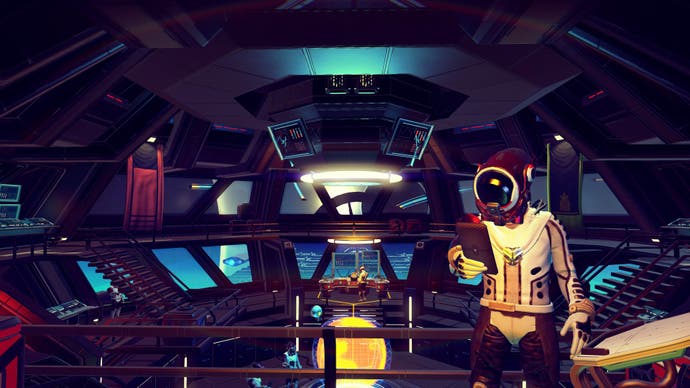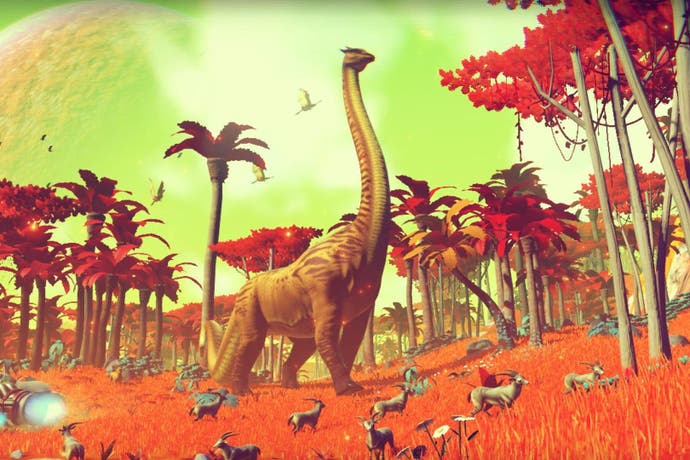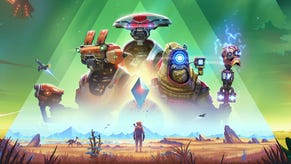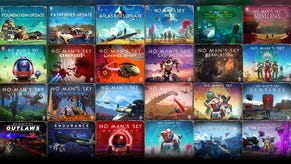No Man's Sky changed the video game hype train forever
Show, don't tell, in the post-preview world.
Love it or hate it, No Man's Sky was the most important, influential video game of 2016.
I'm not talking about the rights and wrongs of developer Sean Murray's pre-release interviews, or the state of the space game at launch. Enough has been said on both those topics already. I'm talking about the fallout, and what it means for video games in 2017 and beyond.
What's clear is some players felt misled by Hello Games. Some demanded a refund from Sony. Some got one from Valve. Whatever your feeling on it, No Man's Sky caused one hell of a shitstorm. But this wasn't a by the numbers video game shitstorm. This one went mainstream - and the industry noticed.
Amid the madness of No Man's Sky's launch, I spoke with a number of video game developers who said the whole thing had affected either the way they planned to discuss their upcoming game, or even the features it would include. One developer told me the industry was watching and learning from the No Man's Sky debacle with keen interest. The upshot? Show, don't tell. Whatever you do, don't do a No Man's Sky.
This seems particularly relevant when it comes to games that want to do something different, something new, or something that's hard to explain. The esoteric, the experiential, or the fusion of genre. The kind of game where you look at a carefully crafted reveal video and think, bloody hell, that looks amazing, but what exactly do you do?
We here at Eurogamer asked this question of No Man's Sky in the run-up to the game's release, in part because gamers were hungry for the answer, but it was also because we were a bit confused by No Man's Sky ourselves. For No Man's Sky, words were not enough. In fact, for No Man's Sky, words were just about the worst thing that could have happened.
Destiny suffered from the No Man's Sky problem two years before No Man's Sky came out. I remember visiting Bungie's offices in Bellevue, Washington, before the studio had revealed any gameplay, expecting the developers to reveal some gameplay. Instead they talked a lot - a lot - about the game. I also remember Activision Publishing boss Eric Hirshberg describing Destiny as a "shared-world shooter". None of us really understood what that meant at the time, so we filled in the blanks. When Destiny launched its beta, realisation set in. This wasn't the game many had hoped for. It was something else.
This is exactly the kind of coverage developers now want to avoid. Confusion, the thinking goes, leads to vague answers, and vague answers lead to excited gamers filling in the gaps. And so, developers have - are - changing tack. No Man's Sky has shown - not that there was any doubt - that we're in the post-preview world. A developer can insist their game will change the world, and the developer may truly believe that's what their game will do. But that sounds a lot like No Man's Sky and look how that turned out.

I haven't made a video game before, but lots of people who have have told me it's a bastard of a thing to do. And many of those people have told me video game development is the last thing upon which promises should be made. A developer who says multiplayer will be in their game when behind the scenes the Is have yet to be dotted and the Ts yet to be crossed as part of the normal process of smashing together a video game to get it ready for release is just asking for trouble. Unless you're Blizzard, of course, and it's Overwatch. It was pretty important for those guys to say multiplayer would be in Overwatch before it came out.
So, what does this mean? It means No Man's Sky has changed the rules of engagement. It means more and more developers are keeping their cards close to their chests for fear of failing to deliver on a promise that never should have slipped out in the first place. And those developers confident enough in their work to let people at it are turning to early doors technical alphas and unedited gameplay videos. These are all the rage in a post-No Man's Sky world.
Take Sea of Thieves, for example. Rare's pirate-themed multiplayer game features exploration and naval combat. At least, that's how it was described when it was announced at E3 2015. Pretty vague, eh? Is it an MMO? Can you play it single-player? Is it free-to-play? Then, a year later, at E3 2016, we go in search of an answer to the inevitable question: what do you actually do in Sea of Thieves? And to go along with that, a combat-focused hands-on demo, which felt more like a hint at what Rare's going for than a slice of the finished article. At the time I spoke with Sea of Thieves developers to ask about the nitty gritty of gameplay, but left the show with more questions than answers. Then No Man's Sky happened.
Fast forward to Christmas 2016, and Rare has launched an Insider Programme that offers fans a chance to test early builds of the game, and a technical alpha in which 1000 people will get to play it. There's a really cool video that shows gameplay and explains what's going on. We get an overview of an actual quest. This is getting closer to what you actually do in Sea of Thieves. Show, don't tell.
If you ask me, this is all a good thing, for gamers and for developers. Hello Games might not have changed video games forever, at least not quite in the way Sean Murray and his rabid community had hoped for, but it did thrust to the forefront the importance of the managed expectation. And let's be honest, in a post-No Man's Sky universe, managed expectations are the centre of the galaxy.










